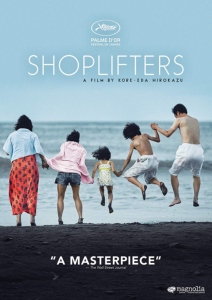When I throw around the phrase “makeshift family” in reviews, I’m usually talking about tight groups of friends. But the Japanese film “Shoplifters” (2018) shows us a more literal makeshift family. It’s about six societal castoffs who live together in a tiny house owned by the woman they call “Grandma” (Kirin Kiki).
Although the film takes a while to pick up speed, writer-director Hirokazu Koreeda does a good job of toying with our expectations and ultimately turning a small character study into something lump-in-your-throat powerful.
The first impression is that patriarch Osamu (Lily Franky) is not admirable, since he has taught a young boy, Shota (Jyo Kairi), how to be an expert shoplifter. (I’m using the IMDB listings for the character names, which change throughout the film as the family members grasp for identity.) But when he brings home 5-year-old Yuri (the adorable Miyu Sasaki), who is on the street and freezing and apparently having been beaten by her parents, it becomes apparent that Osamu has a big heart.
A big chunk of “Shoplifters” explores the unusual lifestyle of this group of six. Not all of their goods and money come from shoplifting. Grandma gets money via what she claims is a pension. Nobuyo (Sakura Andô) and Aki (Mayu Matsuoka) do a tame type of sex work, and also work at a dry cleaner.
Although the house probably isn’t quite as tiny as Koreeda makes us think by his claustrophobic framing choices, it’s clearly a tight fit for four adults and two children. (Too-rare shots of a big rainstorm, snow-covered streets or a day at the beach are refreshingly wide-open in contrast.) Shota’s “room” is the closet, and he seems happy there because it’s his own space. Three people sleep in the living room, which also serves as a dining area. There is a kitchen and a bathroom, but the “shower” consists of throwing buckets of water on one’s self.
While there’s no question this isn’t a great way to live, an interesting thing happens as “Shoplifters” goes forward: We begin to realize that these people are actually kind of happy. There are melancholy strains here and there, like when Aki brings a sad client into her special room at her sex work job, and they hold each other for comfort. But there are also moments of smiles, like when the family plays in the sand and surf.
Osamu and Nobuyo are not good parents in the traditional sense, but the fact that they are good-hearted puts a viewer in their camp. Osamu wants Shota to call him “dad” when he’s ready, and indeed, he does do some good parenting, including teaching the boy about the birds and bees. However, Shota also sees a good slice of the world when he goes out into the city to shoplift, including getting a gradual sense that stealing is wrong.
“Shoplifters” lightly peppers in various mysteries. Yuri’s disappearance from her original home is a big TV news story. And we don’t know exactly how the other five came to find each other in the first place, or if any of them might actually be related.
The film dramatically shifts in the final act to give us these answers while also lightly chastising modern society for its lack of flexibility about the definition of family. It could be argued that Koreeda should’ve emphasized the stress of living as criminals – not only from the shoplifting, but from bigger taboos like kidnapping – before this point.
But by not doing so, he sort of puts a viewer in the shoes of of the kids, where we don’t stress over those bigger issues – partly because Shota and Yuri have the naive happiness of being a kid, and partly because they’re absorbed by kid-level worries. “Shoplifters” can’t possibly have a happy ending, but it’s not a depressing or suffocating movie either, even though common sense says it should be. That’s a neat trick Koreeda pulls off.


